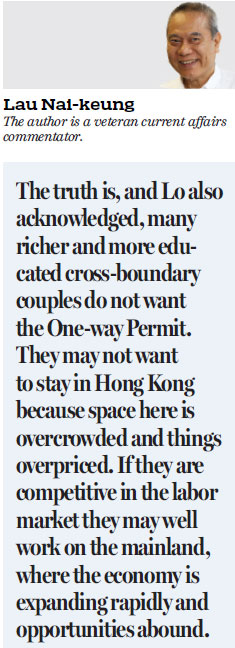Rethinking approach to attract mainland talents

There are calls for HK to control immigration from the mainland but Lau Nai-keung says the city is a less attractive destination now
Zhang Xiaoming, head of the Hong Kong and Macao Affairs Office under the State Council, made the revelation in the latest issue of Bauhinia magazine that it was Lu Ping, Beijing's top gun on Hong Kong affairs during the handover talks, who refused to cede to the local government the power to decide who from the Chinese mainland could visit or settle in the city. Lu stood firm for the country's overall interests.

Zhang's article was not unnoticed. The South China Morning Post's Alex Lo, for example, swiftly called for the Hong Kong government to regain control over immigration approval.
"With the city's rapidly aging population, surely our government has an imperative to allow in younger, richer and better-educated mainland migrants than those under the reunion scheme," he wrote. "The scheme is ready for an overhaul. Our government is always fretting about the need for a population policy. Now if only it had the courage to take that up with mainland authorities."
While this is understandable, because the One-way Permit scheme has contributed up to 10 percent of the local population in the past 20 years, Lo's argument was flawed on a number of points.
First of all, One-way Permit holders have actually become better skilled and more experienced in the workplace over the years, according to government data. They are already "younger, richer and better educated".
Last year, and I am quoting from another report from the Post, about 20 percent of immigrants above 15 years old had attained university or post-secondary education, compared with only 5 percent in 1998. Last year, 40 percent of immigrants older than 15 had working experience on the mainland, while the proportion was 19 percent in 1998.
Yes, this immigrant group had a lower median monthly household income of HK$10,700. But this may very well be caused by the fact that mainstream Hong Kong employers under-appreciate their qualifications on the mainland. This has nothing to do with age or education, but all to do with discrimination.
According to government statistics, from 1997 to last year, there were 488,227 cross-boundary marriages, amounting to 44 percent of all marriages involving Hongkongers in this time period. To suggest these cross-boundary marriages systematically involved inferior partners from the mainland, if you read Lo between the lines, would be unthinkable and offensive.
The truth is, and Lo also acknowledged, many richer and more educated cross-boundary couples do not want the One-way Permit. They may not want to stay in Hong Kong because space here is overcrowded and things overpriced. If they are competitive in the labor market they may well work on the mainland, where the economy is expanding rapidly and opportunities abound.
Therefore, the real question is not about who has the authority to screen, but whether or not Hong Kong remains an attractive place in the eyes of mainland Chinese and their Hong Kong spouses.
Earlier this year, the Hong Kong Ideas Centre, a think tank founded in 2008 and chaired by businessman Fung Siu-por, presented the poll findings on 800 individuals in cross-boundary marriages. The survey - the second of its kind done by the center - was conducted in June and July. Among the interviewees, only half thought that Hong Kong is a suitable place to live in the long term.
At the end of the day, relocation from the mainland to Hong Kong is a national affair and is under the jurisdiction of the central government. It does Hong Kong no good to pretend this is not the case, and talent will not come to our city simply because we grant them a One-way Permit.
There are many pragmatic steps that we can take. For example, a major concern that mainlanders working in Hong Kong share is their children's education. On the one hand, they do not want their kids to be exposed to the anti-mainland propaganda now prevalent in schools and become disrespectful to their parents who do not speak Cantonese. On the other hand, they may not intend to stay in Hong Kong for a long time and would like their kids' education here to be aligned with the national system, but none of the institutions here provides this option.
(HK Edition 12/05/2017 page7)
Today's Top News
- War against aggression commemorated
- Experts sharpen focus on new frontiers of AI
- BRICS urged to advance reform of governance
- Xi congratulates Solomon Islands on 47th anniversary of its independence
- Xi inspects manufacturing company in Shanxi
- Xi pays tribute to martyrs in resistance war against Japanese aggression






























